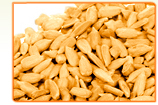Should I Introduce Flaxseed Into My Diet?
 Before deciding whether or not you should introduce flaxseed into your diet to help fight menopausal symptoms, you should learn a little bit more about this plant, and find out if it will help you win your fight against menopause. Continue reading to find out more about the history, uses, side effects and benefits of flaxseed.
Before deciding whether or not you should introduce flaxseed into your diet to help fight menopausal symptoms, you should learn a little bit more about this plant, and find out if it will help you win your fight against menopause. Continue reading to find out more about the history, uses, side effects and benefits of flaxseed.
History and Origin of Flaxseed
Flax is a plant that is grown for both its fibers and its seeds. It is native to the region extending from the eastern Mediterranean to India. Flax has been cultivated for thousands of years; in ancient Ethiopia and in ancient Egypt. Dyed flax fibers have been found that date back to 30,000 BC in the Republic of Georgia. Flax is an annual plant that grows tall and has slender stems, green leaves and pale blue or bright red flowers.
What is Flaxseed?
Flax is not only grown for its seed; other parts of the plant can be used to make fabric, dye, paper, medicines, fishing nets, hair gel and even soap. Flax seeds come in two varieties: brown and yellow (also known as golden). Both types have a similar make up with equal amounts of omega-3 fatty acids. Flax seeds are the source of flaxseed or linseed oil, an edible oil that is used as a nutritional supplement.
How Can Flaxseed Help Me?
 Flaxseed contains high levels of dietary fiber and lignans, an abundance of micro-nutrients and omega 3 fatty acids. Flax seeds have been known to lower cholesterol levels in women, and some studies suggest that adding flax seeds to an individual's diet may help fight certain types of breast and prostate cancer.
Flaxseed contains high levels of dietary fiber and lignans, an abundance of micro-nutrients and omega 3 fatty acids. Flax seeds have been known to lower cholesterol levels in women, and some studies suggest that adding flax seeds to an individual's diet may help fight certain types of breast and prostate cancer.
Nowadays, flaxseed can be found in all types of foods, from crackers to frozen waffles to oatmeal. Flaxseed is chock-full of healthy components, but there are three main ingredients that help give it the title of most powerful plant food on the planet.
Omega 3 essential fatty acids. These good fats have been shown to have heart-healthy effects.
Lignans. These are full of plant estrogen and antioxidant qualities. Flaxseed contains 75-80 times more lignans than other plant foods.
Fiber. Flaxseed contains both soluble and insoluble types of fiber.
These components of flaxseed will no doubt help combat your menopausal symptoms. With estrogen and antioxidant qualities, flaxseed can help regulate your hormones, and keep your body healthy.
You should always know what health benefits you are getting from the food you eat. If you want to know more about natural ways to combat menopause, click on the following link to learn more about other herbs for menopause.



























